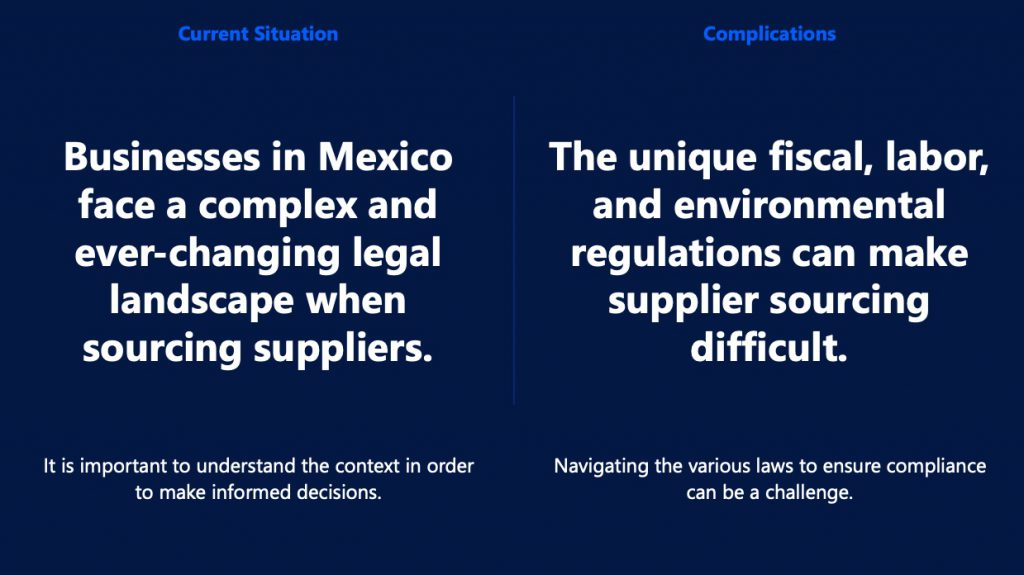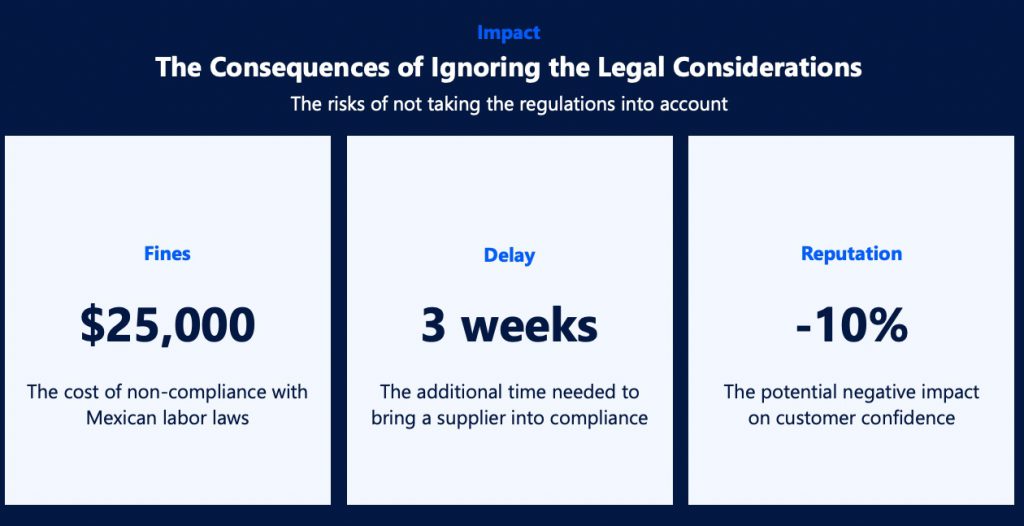Last Updated on March 19, 2025
When it comes to sourcing suppliers in Mexico, understanding the legal considerations is essential for a successful and compliant business operation. Mexico offers a wealth of opportunities for businesses looking for reliable suppliers, but it's crucial to navigate the legal landscape effectively. In this article, we will explore the key legal factors to consider when sourcing suppliers in Mexico.

Understanding the Mexican Legal System
Mexico operates under a civil law system, which is influenced by Spanish and French legal systems. The legal framework in Mexico is primarily governed by federal law, with state laws also playing a role. It is important to have a solid understanding of the Mexican legal system to ensure compliance in your supplier relationships. Here are some key points to keep in mind:
- Commercial supply of goods contracts are regulated by the Code of Commerce (Código de Comercio).
- Civil law in Mexico is based on a codified law and legal principles.
- Private law concerns the legal relationships between individuals.
- Mexico has 13 Free Trade Agreements (FTAs) with 50 countries, including the USMCA and FTAs with the European Union, European Free Trade Area, Japan, Israel, 10 countries in Latin America, and the 11-country Comprehensive and Progressive Agreement for Trans-Pacific Partnership.
- Suppliers are required to comply with all applicable laws and meet certain standards and principles across all areas of their business.
It is critical to consult with legal experts experienced of the Mexican legal system to ensure compliance with all relevant laws and regulations.
Contracts: Don’t Assume a Handshake Is Enough
In some industries, informal agreements might be common, but in Mexico, having a solid contract is non-negotiable. Your contract should clearly outline:
- Payment terms (currency, schedule, penalties for late payments)
- Product specifications (quality standards, compliance requirements)
- Liability and warranties (what happens if something goes wrong?)
- Dispute resolution (Mexican courts, arbitration, or U.S. jurisdiction?)
- Termination clauses (what conditions allow you to end the agreement?)
Mexican law recognizes contracts in Spanish as the official legal document, so even if you draft one in English, a Spanish version is necessary for enforcement.
Selecting the Right Supplier When Sourcing Suppliers in Mexico
A successful partnership depends on selecting the right supplier. It is important to consider several legal aspects when sourcing suppliers in Mexico:
- Business Registration: It is important to verify that the supplier is registered and operates legally in Mexico. Request the supplier's tax identification number (RFC) and confirm its authenticity with the Mexican Tax Administration Service (SAT).
- Legal Entity: Determine the legal entity type of the supplier, whether it is a sole proprietorship, partnership, or corporation. Each entity type has different legal implications, such as liability and tax obligations.
- Contracts and Agreements: Establishing clear and comprehensive contracts with your suppliers is essential. Contracts should outline terms and conditions, pricing, delivery schedules, and quality standards. It is recommended to have contracts written in both English and Spanish, and consult with a bilingual attorney to ensure their legality.
Intellectual Property Protection
When sourcing Mexican suppliers, it is crucial to protect your intellectual property rights (IP). Here are some key points to keep in mind:
- Your U.S. trademarks and patents will not protect you in Mexico, so it is important to register and enforce your IP rights under Mexican national legislation.
- Signatories of the Berne Convention for the Protection of Literary and Artistic Works provide protection to each other's nationals' copyrighted works and provide that nationals of all signatory countries be provided with the same rights as Mexicans .
- Securing patents and trademark rights is on a first-to-file basis, so it is recommended that you consider applying for trademark and patent protection even before selling your products or services in the Mexican market.
- It is vital that companies understand that intellectual property is primarily a private right, so it is important to create a solid contract that includes non-compete clauses and confidentiality/non-disclosure provisions.
- Working together with trade associations and organizations can also help small and medium-sized companies understand the importance of protecting their IP rights.
- Mexico is a member of the World Trade Organization (WTO), which sets international standards for IP protection, as well as other trade agreements such as the USMCA and FTAs with the European Union, European Free Trade Area, Japan, Israel, 10 countries in Latin America, and the 11-country Comprehensive and Progressive Agreement for Trans-Pacific Partnership.
Intellectual property rights (IPRs) are important assets for any business, and they are especially important for businesses that are sourcing suppliers in Mexico. Mexico has a strong legal framework for protecting IPRs, but it is important to take steps to protect your IPRs before you start sourcing in Mexico. This includes registering your IPRs with the Mexican government, and using appropriate contracts and agreements with your suppliers.
Source: "Intellectual Property Rights in Mexico: A Guide for Businesses" by the U.S. Chamber of Commerce
Ensuring Labor Laws and Compliance When Sourcing Suppliers in Mexico
Knowing and following Mexican labor laws is a must when sourcing suppliers in Mexico. These laws are in place to protect workers, promote fair treatment, and ensure safe working conditions. If you understand the rules, you can avoid legal headaches and make sure your supply chain meets ethical and legal standards.
Mexican labor laws cover a lot—contracts, wages, work hours, benefits, and employee protections. It’s important to check that your suppliers follow these regulations and treat their workers fairly.
One key area to watch is employment contracts. Suppliers should have proper contracts that outline wages, overtime pay, vacation time, and social security contributions. Making sure these are in place helps create fair working conditions and keeps your business on the right side of the law.
Labor laws in Mexico also cover worker rights like union membership, collective bargaining, and protection against discrimination. When suppliers respect these rights, it not only keeps them compliant but also fosters a positive work environment. And let’s be honest—working with ethical suppliers benefits everyone, including your business.

Environmental Regulations When Sourcing Suppliers in Mexico
Environmental responsibility is crucial when sourcing suppliers. In today's world, sustainability and resource conservation have become imperative for businesses across industries. When selecting suppliers, it is vital to assess their commitment to eco-friendly practices and environmental regulations. By prioritizing environmental responsibility, businesses can reduce their carbon footprint, minimize waste generation, and conserve natural resources. Sourcing from suppliers who prioritize sustainable sourcing, energy efficiency, waste reduction, and responsible disposal practices aligns with global sustainability goals. However, it also enhances the business's reputation and credibility.
Take into account the following regulations in Mexico:
- Environmental Permits: Ensure that your suppliers have obtained the necessary environmental permits and comply with regulations regarding waste management, emissions, and other environmental aspects.
- Hazardous Materials: If your business deals with hazardous materials, ensure that suppliers follow proper handling, storage, and disposal protocols to minimize environmental impact and comply with Mexican environmental laws.
Anti-Corruption Laws: Play by the Rules
Bribery and corruption are real concerns in international business. The U.S. Foreign Corrupt Practices Act (FCPA) applies to American companies operating abroad, meaning you can face penalties if your supplier engages in shady business practices.
To stay compliant:
- Conduct background checks on suppliers
- Implement anti-corruption clauses in contracts
- Train employees on ethical sourcing practices
Ignoring this could not only damage your reputation but also lead to legal trouble.
Due Diligence: Vet Your Supplier Like Your Business Depends on It (Because It Does)
Before partnering with a supplier, conduct thorough due diligence. Here’s a checklist:
- Verify business registration (Is the company legally established in Mexico?)
- Check financial stability (Are they in debt or facing lawsuits?)
- Request compliance certifications (ISO, environmental, labor compliance)
- Visit the facility in person (Seeing operations firsthand can reveal a lot)
Partnering with the wrong supplier can cause more than production delays—it can lead to legal liabilities.
Conclusion: Understanding the Mexican Legal System Is Key to a Successful Supplier Sourcing Process.
Sourcing suppliers in Mexico opens up a world of exciting opportunities, but it is essential to navigate legal considerations effectively. By familiarizing yourself with the regulatory framework, you can make informed decisions and mitigate potential risks. Choosing the right suppliers is crucial, as it sets the foundation for a productive and reliable partnership. Conduct thorough research, evaluate their track record, and assess their compliance with legal and ethical standards. Protecting intellectual property is paramount when working with Mexican suppliers. Registering trademarks, copyrights, and patents can safeguard your innovations and creations.
Furthermore, complying with labor laws is vital to maintaining ethical supplier relationships. Ensure that employment contracts align with Mexican labor regulations and prioritize fair working conditions. Lastly, adhere to environmental regulations to promote sustainability. Verify that suppliers follow environmentally responsible practices and comply with waste management and conservation protocols. By addressing these legal considerations, businesses can establish strong and legally compliant partnerships with Mexican suppliers.
FAQs
Q: What legal factors should I consider when sourcing suppliers in Mexico?
A: When sourcing suppliers in Mexico, consider factors such as business registration, legal entity, contracts and agreements, intellectual property protection, labor laws, and environmental regulations.
Q: How can I protect my intellectual property when sourcing suppliers in Mexico?
A: Register your trademarks, copyrights, and patents with the relevant Mexican authorities. Clearly define ownership and usage rights in your contractual agreements with suppliers.
Q: What should I look for in employment contracts with suppliers in Mexico?
A: Ensure that employment contracts specify wages, working hours, benefits, and other relevant terms aligned with Mexican labor laws.
Q: Are there specific regulations regarding child labor and forced labor in Mexico?
A: Yes, Mexican laws prohibit the employment of minors under the age of 15 and regulate working conditions for minors aged 15 to 18. Suppliers should comply with these regulations.
Q: How can I ensure compliance with environmental regulations when sourcing suppliers in Mexico?
A: Verify that suppliers have obtained the necessary environmental permits and follow proper protocols for handling, storage, and disposal of hazardous materials.
About NovaLink
As a manufacturer in Mexico, NovaLink employs a unique approach that transcends the traditional model of shelter production. More than just the location of your manufacturing, we would like to become a partner in your manufacturing in Mexico. You will be able to relocate or initiate manufacturing for your company in Mexico in a low-cost labor environment with very little delay or up-front costs. Find out how we can help you by handling the manufacturing process.
There are NovaLink facilities in the border cities of Brownsville, Texas, Matamoros, Mexico, and Saltillo, Mexico.
Explore More: Discover Related Blog Posts
Expand your knowledge and delve deeper into sourcing in Mexico with our curated collection of related blog posts.
- How Mexico Is Strengthening Supply Chains for Long-Term Stability
- Is Your Supply Chain Ready for a Mexico Move?
- How to Streamline Supply Chains in Mexico Without Losing Your Mind (or Your Margin)
- The Most Overlooked Advantage of Mexico’s Logistics Infrastructure
- Stop Wasting Time—These Are the Fastest Trade Routes in Mexico